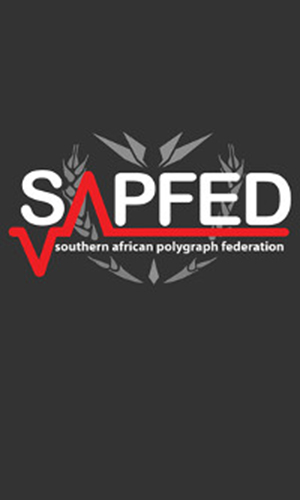SAPFED Presents the Annual Continuous Education and Professional Development Seminar
6 and 7 September 2013
SAPFED is proud to present this professional development and continuous education seminar to be held on
the 6th and 7th of September 2013 at J’Cups in Clubview Centurion in conjunction with the 2013 AGM.
The Seminar is open to all professionals who have an interest in polygraph and presenting of polygraph evidence.
Investigators and clients who make use of polygraph are welcome to attend and will benefit from this seminar and training.
COST: R625 for members R950 for non members
Space is limited and bookings will only be confirmed upon receipt of payment.
PROGRAMME
Ryan De Lange (Friday 6th September 09H00 – 12H30)
Litigation Director for The Labour Workshop completed his BA Law at the University of Johannesburg and is in the
process of completing his LLB through UNISA with 5 years experience in HR/IR issues will present.
Discussion of Sedibeng district municipality matter judgement and the implications of same
Interesting case law with regards to polygraph testing
Admissibility of polygraphs as evidence in case law
Polygraph test clause as a term of the employment contract and the validity thereof
Open floor with regards to questions pertaining to polygraph testing and general labour law questions
Proposed amendments to the LRA and the possible implications
Louis Nortjie (Friday 6th September 13H00 – 16H00)
Joined Military Intelligence in 1989 and served in the Defence Force until 1995, since 1996 he has been
developing and presenting courses in Manipulation Communication and in 2012 completed his training in
Polygraph.
Subject Jargon:
Words used in the questioning environment and their meaning
Basic Communication Requirements:
An introduction to the required steps of communication as the basis of good questioning
Students should be able to understand the following:
a. Rapport, to create and maintain.
b. Active Listening.
c. Question construction, types of questions and their uses.
d. Communication languages and how to read them.
Structure for effective questioning:
Steps to assist the Forensic Questioner from preparation phase to successful completion.
SAPFED AGM (Friday 6th September 17H00 – 19H00)
PROGRAMME (Saturday 7th September 09H00 – 13H00)
Information Preparation:
The historical questioning planning included a 16 page document that took up a good part of the process,
How to cut that process short without losing critical information.
Questioning Methods:
SANDF, American Secret Service and Mossad methods of questioning, and the application of the methods.
Legal Aspects:
All legal aspects applicable to the process
Practical Tips:
Practical examples and tips
